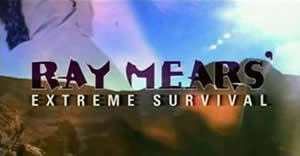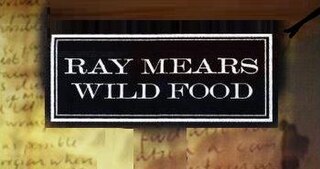Major Leslie James Hiddins AM, known as "The Bush Tucker Man" is a retired Australian Army soldier and war veteran who is best known for his love and knowledge of the Australian bush. Hiddins is recognized by his distinctively modified Akubra hat.

Raymond Paul Mears is a British woodsman, instructor, businessman, author and TV presenter. His TV appearances cover bushcraft and survival techniques.

Serious, Serious Explorers in later series, is an observational documentary series made by the BBC and broadcast as part of their children's programming. It encompasses Serious Jungle (2002), Serious Desert (2003), Serious Arctic (2005), Serious Amazon (2006), Serious Andes (2007), Serious Ocean (2008) and two series of Serious Explorers (2011).

Edward Michael "Bear" Grylls is a British former SAS trooper who is a survival expert, adventurer, and television presenter. He first drew attention after embarking on a number of notable adventures, including several world records in hostile environments, and then became widely known for his television series Man vs. Wild (2006–2011). He is also involved in a number of wilderness survival television series in the UK and US, such as Running Wild with Bear Grylls and The Island with Bear Grylls. In July 2009, Grylls was appointed as The Scout Association’s youngest-ever Chief Scout of the United Kingdom and Overseas Territories at age 35, a post he has held for a second term since 2015 and in 2024 became the 2nd longest serving Chief Scout after Robert Baden-Powell.

Bushcraft is the use and practice of skills, thereby acquiring and developing knowledge and understanding, in order to survive and thrive in a natural environment.
Polar ecology is the relationship between plants and animals in a polar environment. Polar environments are in the Arctic and Antarctic regions. Arctic regions are in the Northern Hemisphere, and it contains land and the islands that surrounds it. Antarctica is in the Southern Hemisphere and it also contains the land mass, surrounding islands and the ocean. Polar regions also contain the subantarctic and subarctic zone which separate the polar regions from the temperate regions. Antarctica and the Arctic lie in the polar circles. The polar circles are imaginary lines shown on maps to be the areas that receives less sunlight due to less radiation. These areas either receive sunlight or shade 24 hours a day because of the earth's tilt. Plants and animals in the polar regions are able to withstand living in harsh weather conditions but are facing environmental threats that limit their survival.
Benedict Colin Allen FRGS is an English writer, explorer, traveller and filmmaker known for his technique of immersion among indigenous peoples from whom he acquires survival skills for hazardous journeys through unfamiliar terrain. In 2010, Allen was elected a Trustee and Member of Council of the Royal Geographical Society.
Bruce Parry is an English documentarian, indigenous rights advocate, author, explorer, trek leader and former Royal Marines commando officer. He employs an ethnographic style and a form of participant observation for his documentaries.

Extreme Survival is a survival television series hosted by Ray Mears. The series was produced for the BBC. In the series Mears demonstrates his wilderness skills and presents tales of survival from some of the world's most difficult environments. The show was first broadcast in 1999, after the success of World of Survival from 1997 to 1998, and ended in 2002.
The Living Edens, a series of specials aired on PBS from 1997 to 2003, had Peter Coyote and Linda Hunt as narrators. Reader's Digest provided partial funding for the series and received various marketing rights in return.

The Living Planet: A Portrait of the Earth is a BBC nature documentary series written and presented by David Attenborough, first transmitted in the UK from 19 January 1984.

Bushcraft is a survival television series hosted by Ray Mears. The series airs on the BBC in United Kingdom, it also shown on Discovery Channel in the United States, Canada, India, Italy, Brazil, New Zealand, Australia, Czech Republic, Norway, Sweden, The Netherlands, Romania and Russia. Following on from Extreme Survival, Bushcraft was first shown in 2004, and ended in 2005.

Wild Food Documentary is a documentary television series hosted by Ray Mears. The series airs on the BBC in United Kingdom, it is also shown on Discovery Channel in the United States, Canada, India, Italy, Brazil, New Zealand, Australia, Norway, Sweden, The Netherlands and Russia. The show was first broadcast with an episode set in Australia and ended with "Woodland". The theme tune is not unlike the one heard in World of Survival.

Ray Mears Goes Walkabout is a survival television series hosted by Ray Mears, showing Mears in Australia. The series aired from 2008 on the BBC in United Kingdom, and was also shown on Discovery Channel in Canada, India, Italy, Brazil, New Zealand, Australia, Norway, Sweden, the Netherlands, Russia, and the United States. The broadcast version uses an updated Australian-themed take on the opening theme music to Ray Mears' World of Survival.

Survival is one of television's longest-running and most successful nature documentary series. Originally produced by Anglia Television for ITV in the United Kingdom, it was created by Aubrey Buxton, a founder director of Anglia TV, and first broadcast in 1961. Survival films and film-makers won more than 250 awards worldwide, including four Emmy Awards and a BAFTA.

Ray Mears' Northern Wilderness is a television series hosted by Ray Mears, showing Mears in Canada. The series is broadcast by the BBC.

Survival with Ray Mears is a 3-part television series hosted by Ray Mears, following him as he tracks predators in their natural habitats. The series was broadcast by ITV, and was billed as the return of the Survival brand. It was followed by Wild Britain with Ray Mears.
Survive the Tribe is a television series which airs on the National Geographic Channel. In the program Hazen Audel visits several tribes around the world and participates in their daily lives. He learns about their survival tactics. Hazen Audel went on to make Primal Survivor, also for National Geographic.
Andrew Thomas Price is presenter of the ITV Cymru Wales programme Coast & Country. The series began in October 2013.

Alone is an American survival competition series on History. It follows the self-documented daily struggles of 10 individuals as they survive alone in the wilderness for as long as possible using a limited amount of survival equipment. With the exception of medical check-ins, the participants are isolated from each other and all other humans. They may "tap out" at any time, or be removed due to failing a medical check-in. The contestant who remains the longest wins a grand prize of $500,000 (USD). The seasons have been filmed across a range of remote locations, usually on first nations-controlled lands, including northern Vancouver Island, British Columbia, Nahuel Huapi National Park in Argentina, Patagonia, Northern Mongolia, Great Slave Lake in the Northwest Territories, and Chilko Lake in interior British Columbia.













